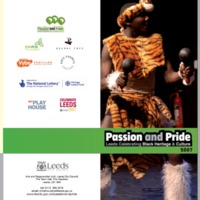
Passion and Pride
Passion and Pride was a creative partnership project bringing together Leeds City Council's Arts and Regeneration Unit with twelve local community organisations. Building on momentum established through Black History Month, the performances, exhibitions and workshops celebrated black heritage and culture in Leeds during 2007. Highlights included the performance of 'Grandma's Story' at West Yorkshire Playhouse by the 10-2 Club, a short play about the real life experience of living through slavery.
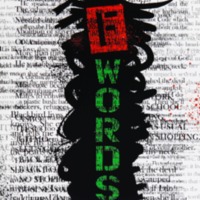
FWords
FWords was a creative response of eight Yorkshire writers and artists to the commemoration of the Abolition Act, in a project led by Peepal Tree Press in Leeds. Focusing on the many variations of the theme of 'Freedom', Fwords was created to raise the profile of Yorkshire's rich heritage of talented artists, descendants of those who migrated, forcefully and otherwise from Africa and beyond. The work of six writers was illustrated with work from two visual artists, and with a foreword from Caryl Phillips. The project was supported by printed materials, broadcasts, digital and dedicated web pages.
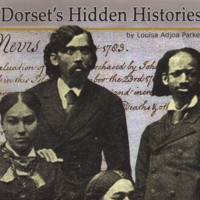
Dorset's Hidden Histories
DEED (Development Education in Dorset) works within the community to develop understanding of global education and cultural diversity. The charity produced and made available to hire the Dorset's Hidden Histories touring exhibition, which explored 400 years of the stories of people with African and Caribbean heritage across Dorset, Bournemouth and Poole. Many Dorset families were involved in slavery, either owning or trading in African slaves, and Black people were brought to Dorset by slave traders to live as servants in the large country houses. The exhibition, which is still available to borrow, also includes details of African American GIs on Poole Quay, a freed enslaved American living in Bournemouth, and Belle Davis, the African-American singer and dancer who performed in Weymouth in 1917. The organisation worked with Louisa Adjoa Parker, a local poet and black history researcher, to provide creative writing workshops to explore the exhibition. An accompanying booklet, written by Parker, can be purchased from DEED.
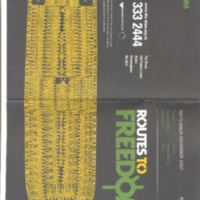
Connexions: History in the Making
20 young people from the Aston area of Birmingham worked on a commemorative project exploring the impact of the 1807 Act on the African, Caribbean and Asian communities in the UK and the contributions of these communities to British society since then. Their performance at The Drum showcased poetry, singing and dance.
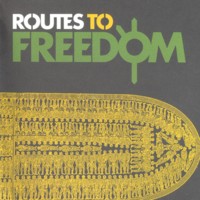
Routes to Freedom
The 'Routes to Freedom' season of events took place throughout Autumn 2007 at The Drum, an intercultural arts venue in Birmingham. The programme explored the struggle for social justice and equality in relation to African, Asian and Caribbean communities, and marked two key historical events and their impact: the bicentenary of the Abolition of the Slave Trade Act and the 60th anniversary of the partition of the Indian subcontinent. The programme was made up of theatre productions, touring exhibitions, film screenings, readings, dance performances and special events, including 'Coolies of the Caribbean' and a conference about Olaudah Equiano.
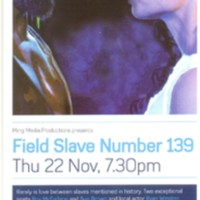
Field Slave Number 139
'Field Slave Number 139' was written and produced by Ava Ming, and commissioned by The Drum in Birmingham as part of their Routes to Freedom programme. The play focuses on a love story between a dark-skinned field slave and mulatto house slave on a plantation in America's Deep South. 'Field Slave Number 139' is written mostly in monologues with occasional interaction between the actors: all three were on stage for the duration of the piece. The 2007 production featured two performance poets and a local actor.
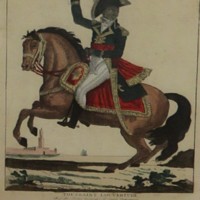
Freedom Think Tank
Freedom Think Tank was a time limited Black-led voluntary group established to influence the agendas of organisations in the North East commemorating the bicentenary of the abolition of the slave trade. The group also organised commemorative events, focusing on themes of promoting social solidarity and raising awareness of the participation of Black people in abolition.
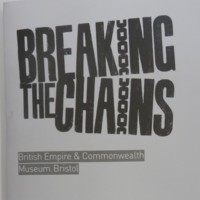
Breaking the Chains
Breaking the Chains opened at the British Empire and Commonwealth Museum to coincide with the bicentenary, and told the story of the British transatlantic slave trade and its abolition. Developed in partnership with Bristol City Council's Museums, Galleries and Archives' Service, the exhibition used artefacts, film and testimony to challenge perceptions about Britain's involvement in the slave trade and its legacy today. It featured a multimedia gallery of digital memories and feelings on the contemporary legacies of the slave trade; interactive sound stations to see and hear personal testimonies and the power of black music; and the ‘Me deya’ gallery, led by Firstborn Creatives, a collection of work from artists and communities who wished to share their creative pieces about the legacies of the slave trade. Associated events included African music for children, community dance events and public debates.
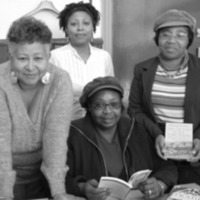
Interwoven Freedom
SCAWDI are a Birmingham-based community group specialising in working with local volunteers to research the early presence of Black people in the West Midlands. In collaboration with English Heritage, ‘Interwoven Freedom’ enabled a group of local women to visit archives, exhibitions and historic sites and explore the role of women in the abolitionist movement. The participants drew on traditions of abolitionist women such as Elizabeth Cadbury creating and distributing workbags filled with anti-slavery manifestos by making their own textile bags from fair trade cotton and African cloth. They wrote their own manifestos which mixed historical facts with fictional stories and poems. The accompanying exhibition of textiles, text panels and an audio documentary toured London and 11 regional venues. The exhibition included photographs documenting the project by photographer Vanley Burke.
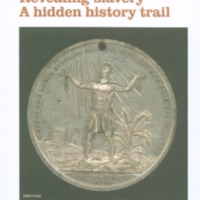
Revealing Histories: Remembering Slavery (Bolton Museum and Archives)
Bolton Museum and Archives was one of eight heritage bodies in the 'Revealing Histories: Remembering Slavery’ partnership in Greater Manchester. The project set out to explore the history, impact and legacy of slavery on Britain through collections and community links in the North West.
Bolton Museum and Archive Service launched a trail around its galleries to re-interpret objects on display in the context of slavery and its legacies. At the centre of the trail was Samuel Crompton's spinning mule, a machine which helped to revolutionize the British cotton industry. As part of the project, Bolton Council republished and distributed 'The Narrative of the Life of James Watkins', originally published in 1852. Watkins escaped slavery in the southern United States and travelled to Lancashire to become an anti-slavery campaigner. The museum also hosted African folk storytelling sessions, and produced a Key Stage 3 education pack, 'Chains and Cotton: Bolton’s Perspective on the Slave Trade'. A special event day, 'Facing up to the past' featured performances, poetry reading and debate.
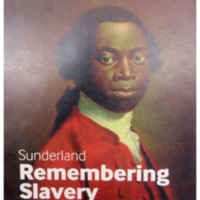
Sunderland Remembering Slavery
Remembering Slavery 2007 involved museums, galleries and other cultural organisations across the North East of England in a programme of exhibitions, events, performances, lectures and activities to explore the themes of slavery and abolition, and identify connections with the region.
In Sunderland, the Museum and Winter Gardens hosted a varied programme of activities under the Remembering Slavery 2007 umbrella, including African drumming sessions, African inspired textile crafts, poetry workshops and storytelling. There were also guided walks around the sites associated with James Field Stanfield, the leading Sunderland campaigner against the slave trade. Elsewhere in the city, The Power of Words: an Image of Africa Past and Present was a creative writing project in collaboration with the Sunderland African Association. Participants worked with poet and writer Sheree Mack to produce poems exploring slavery and its relevance in contemporary times.
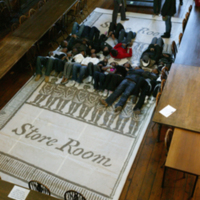
Changing Perspectives
Changing Perspectives was a community-based initiative based around the experiences of twenty-five African and Caribbean families from the North-East, to explore how their life in the UK contrasts with the lives of their ancestors. The project created a multimedia archive of cultural responses to celebrate the heritage of these families. This included oral testimonies, creative writing, photography, digital storytelling and art, emerging from a variety of community-led workshops. A series of workshops were held at Durham University Library, Archives and Special Collections (pictured), including a session aimed at children and young people, which focused on the experiences of children in the slave trade via extracts from the autobiography of Olaudah Equiano. Project outputs included a book, an interactive website, an exhibition of words and pictures of the community, an oral testimony collection, and series of documentary films. A key aim of the project was to promote community cohesion and develop cross cultural awareness and understanding.